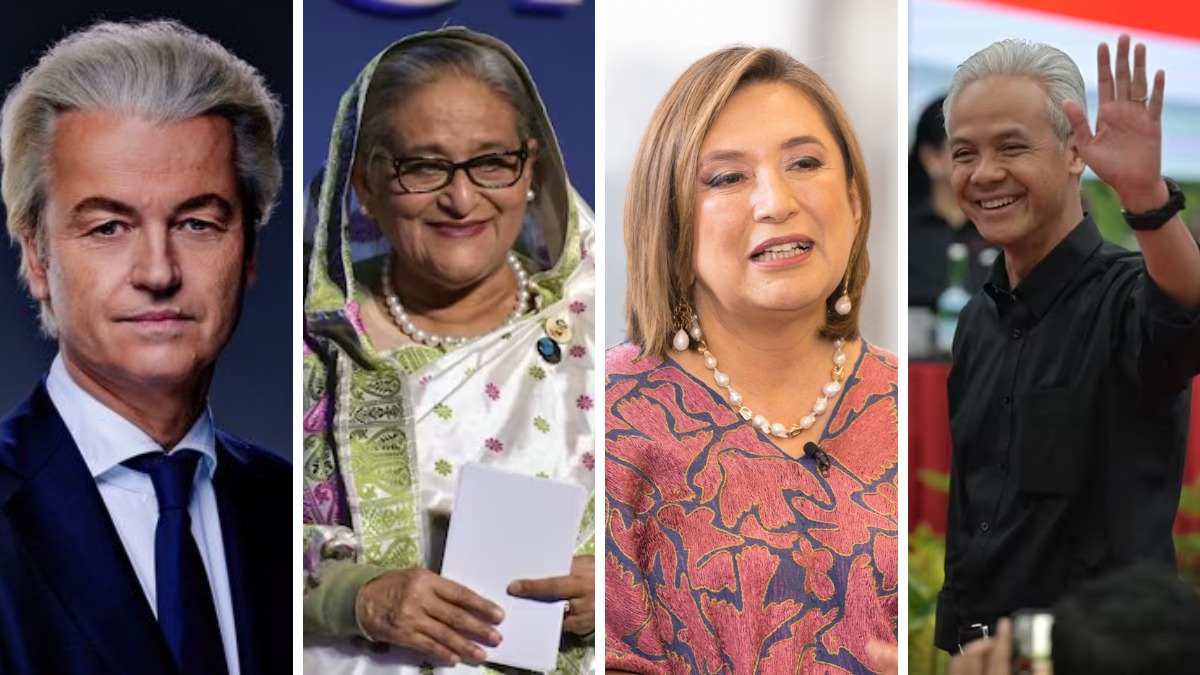The globe witnessed crucial political shifts in 2024, with significant power transitions in several nations deeply impacting domestic policies and international relations. Moreover, the rise of far-right parties illustrates a sweeping transformation in the global political landscape. Let's examine some examples...
Bangladesh
Prime Minister: Sheikh Hasina (Awami League)
Defeated: Khaleda Zia (Bangladesh Nationalist Party, BNP) and other opposition leaders
Sheikh Hasina's continued leadership assures political stability in Bangladesh but also raises concerns of democratic decline due to allegations of voter suppression and political violence. Her victory is attributed to economic achievements and infrastructure development during her tenure. Nonetheless, accusations of electoral manipulation have been levied against Hasina. Political volatility in Bangladesh significantly affects the geopolitics of South Asia, impacting its relations with India and China, and the regional security landscape.
Bhutan
Prime Minister: Tshering Tobgay (Druk Phuensum Tshogpa, DPT)
Defeated: Lotay Tshering (Druk Nyamrup Tshogpa, DNT)
Tshering Tobgay's emergence as Bhutan's Prime Minister symbolizes a significant political shift. His leadership will focus on Bhutan's sustainable development and balanced foreign policy, notably enhancing relations with both India and China. Tobgay's victory is largely accredited to voter dissatisfaction with the economic management and public service distribution under the previous government.
Netherlands
Prospected Prime Minister: Geert Wilders (Party for Freedom, PVV)
Defeated: Mark Rutte's VVD and other centrist and left-wing parties
Geert Wilders' far-right PVV emerged as the largest party in the 2024 elections, reflecting a shift among Dutch voters towards nationalist and anti-immigration sentiments. The challenge now lies in forming a coalition government, as no party has a clear majority. Wilders has been an advocate for stricter immigration policies and a re-evaluation of the Netherlands' role within the European Union.
Taiwan
President: Lai Ching-te (Democratic Progressive Party, DPP)
Predecessor: Tsai Ing-wen (DPP)
Defeated: Hou You-yi (Kuomintang, KMT)
Lai Ching-te succeeded Tsai Ing-wen, signifying continuity in DPP's leadership. His pro-sovereignty stance (regarding Taiwan as an independent nation) and focus on strengthening Taiwan's security led to his electoral victory. Lai's policies will greatly affect cross-strait relations and Taiwan's interactions with key global powers, especially the United States. His success symbolizes resistance to China's threats and a bolstering of Taiwan's international presence.
Indonesia
President: Prabowo Subianto (Gerindra Party)
Defeated: Ganjar Pranowo (PDI-P) and Anies Baswedan (Independent)
Prabowo Subianto's election heralds a significant change in Indonesian politics. His campaign centered on economic reform, national security, and anti-corruption. Prabowo's administration will need to address these issues while balancing Indonesia's strategic role in ASEAN, and its relations with the United States and China. Prabowo's victory also marks the end of Joko Widodo's (Jokowi's) two-term presidency, with Jokowi backing Prabowo's candidacy to influence post-presidential political landscape.
Pakistan
Prime Minister: Shehbaz Sharif (Pakistan Muslim League-Nawaz, PML-N)
Defeated: Imran Khan (Pakistan Tehreek-e-Insaf, PTI)
Amidst a politically tense climate, Shehbaz Sharif retained the Prime Minister's seat by defeating Imran Khan. Sharif's government formation was aided by a coalition with Bilawal Bhutto Zardari led Pakistan People's Party (PPP). The PPP has lent external support to the Sharif government. Neither party achieved a majority in the general elections. Post-election coalition between PPP and PML-N saved the country from political instability, highlighting the importance of strategic alliances in Pakistani politics. Sharif's government faces key challenges, including economic reforms and combatting terrorism threats, essential for regional stability.
Maldives
President: Mohamed Muizzu (People's National Congress, PNC)
Defeated: Ibrahim Mohamed Solih (Maldivian Democratic Party, MDP)
Mohamed Muizzu's pro-China stance reflects a significant shift in Maldivian foreign policy. His landslide victory represents voter support for reducing Indian influence and strengthening ties with China. Muizzu's 'India Out' campaign slogan and steps to repatriate Indian military personnel exemplify his commitment to enhancing relations with China, drastically affecting regional geopolitics.</




